Requesting A Reference Letter
As an AI language model, I can certainly help you draft a reference letter. However, please note that I won't be able to provide personalized information about you or your specific experiences. To get the most effective reference letter, it's essential to approach someone who knows you well and can speak to your abilities, skills, and character. This person could be a former employer, supervisor, professor, or someone who has worked closely with you.
If you'd like a general template for a reference letter, here's one you can use as a starting point:
[Your Name]
[Your Address]
[City, State, ZIP Code]
[Your Email Address]
[Your Phone Number]
[Today's Date]
[Recipient's Name]
[Recipient's Job Title / Company Name]
[Company Address]
[City, State, ZIP Code]
Dear [Recipient's Name],
I am writing to recommend [Applicant's Full Name] for [the position / opportunity being pursued] with [Company/Organization Name]. I have had the pleasure of knowing and working with [Applicant's Name] for [duration of your professional relationship or the context in which you know them], and I am delighted to provide this reference letter on their behalf.
[Include a brief introduction of how you know the applicant and the context of your relationship, e.g., as a former manager, coworker, professor, etc.]
[Next, highlight the applicant's key skills, qualities, and achievements. Be specific and provide concrete examples to support your claims. Address how the applicant's skills align with the position or opportunity they are seeking.]
1. [Skill/Quality 1]: [Example of how the applicant demonstrated this skill or quality]
2. [Skill/Quality 2]: [Example of how the applicant demonstrated this skill or quality]
3. [Skill/Quality 3]: [Example of how the applicant demonstrated this skill or quality]
[You can add more skills or qualities as per the applicant's profile and your relationship with them.]
In addition to their technical abilities, I must also mention that [Applicant's Name] possesses excellent communication skills and a strong work ethic. They are proactive in taking on new challenges and consistently deliver high-quality results. Their ability to work collaboratively in a team environment while also taking initiative on individual projects is commendable.
Moreover, [mention any specific achievements, awards, or recognitions the applicant has received, if applicable].
In conclusion, I wholeheartedly recommend [Applicant's Full Name] for [the position / opportunity being pursued]. I am confident that their dedication, passion, and expertise will make them a valuable asset to your team.
Should you require any further information or have any questions, please feel free to reach out to me at [Your Email Address] or [Your Phone Number].
Thank you for considering [Applicant's Name] for this opportunity.
Sincerely,
[Your Name]
[Your Job Title (if applicable)]
[Your Company/Organization Name (if applicable)]
Please remember to customize this template with the specific details of the person you are recommending, their skills, and the position or opportunity they are seeking. Always seek the applicant's permission before sharing a reference letter on their behalf.
Formal Reference Letter Request for Job Application
Subject: Request for a Reference Letter
Dear [Recipient Name],
I hope this message finds you well. I am writing to request a reference letter to support my application for the [Position Name] at [Company Name]. Your perspective on my skills and performance during my tenure at [Previous Company/Institution] would greatly strengthen my application.
I would be grateful if you could highlight my experience in [specific skills or projects], my professional conduct, and any achievements you deem relevant. Please let me know if you require any additional information or documents to facilitate this request.
Thank you very much for considering my request.
Sincerely,
[Your Name]
[Contact Information]
Casual Email Request for Academic Reference
Subject: Favor to Ask – Reference Letter
Hi [Professor/Instructor Name],
I hope you are doing well! I am applying for [Program/Scholarship Name] and was wondering if you would be willing to write a reference letter for me. Your guidance and experience during [Course/Project] make your endorsement extremely valuable.
I can provide my resume and a draft of key points if it helps. Please let me know if you are comfortable assisting me with this.
Thanks a lot,
[Your Name]
Heartfelt Reference Request for Personal Recommendation
Subject: Request for Personal Reference Letter
Dear [Recipient Name],
I hope you are well. I am reaching out to request a personal reference letter for [specific purpose, e.g., scholarship, volunteer position, membership]. Your insight into my character and values would mean a great deal and help convey my suitability for this opportunity.
If you are able, please include any examples of my contributions or qualities that you believe are relevant. I would be happy to provide more information or meet to discuss this further.
Thank you sincerely for considering my request.
Warm regards,
[Your Name]
Provisional Request for Reference Letter
Subject: Preliminary Request for Reference Letter
Dear [Recipient Name],
I am writing to tentatively request your support with a reference letter for [Job/Program/Opportunity]. While I am still finalizing my applications, I wanted to ask early to ensure you have sufficient time.
If you are willing, I will provide the complete details and a suggested outline once my application is ready. Your guidance and endorsement would be greatly appreciated.
Best regards,
[Your Name]
Quick and Simple Reference Request Email
Subject: Quick Request for Reference
Hi [Recipient Name],
I hope you are well. Could you kindly provide a reference letter for my application to [Program/Job Name]? I would greatly appreciate your support.
Thank you,
[Your Name]
Formal Printed Request for Reference Letter
Subject: Request for Reference Letter for Professional Purposes
Dear [Recipient Name],
I am writing to formally request a reference letter for my upcoming application to [Job/Position/Program]. Your knowledge of my professional abilities and accomplishments would provide a meaningful endorsement.
Please highlight my skills in [specific areas], accomplishments, and professional conduct during my time at [Organization/Institution]. I would be happy to provide supporting documents or meet to discuss the content.
Thank you in advance for your time and consideration.
Sincerely,
[Your Name]
[Title/Position]
[Contact Information]
Informal Request for Reference Letter via Email
Subject: Can You Help Me With a Reference?
Hey [Recipient Name],
I hope everything is going well! I’m applying for [Program/Job/Opportunity] and thought of you as someone who knows my work and character well. Would you be willing to write me a reference letter?
I can send over my resume or a summary of my experience to make it easier. Thanks so much for considering!
Best,
[Your Name]
Creative Reference Letter Request for Scholarship
Subject: Help Me Shine – Reference Letter Request
Dear [Recipient Name],
I am excited to apply for [Scholarship/Program Name], and your recommendation would play a pivotal role in my application. Your insight into my accomplishments and passion for [field/subject] would help the committee see my potential.
I would be grateful if you could emphasize my strengths in [specific achievements or skills]. Please let me know if you need any materials or talking points.
Thank you for supporting my journey.
Warmly,
[Your Name]
What is a Reference Letter Request and Why You Need It
A Reference Letter Request is a formal or informal message sent to ask someone to write a letter endorsing your skills, character, or accomplishments.
- Purpose: Provide a credible endorsement for employment, academic programs, scholarships, or other opportunities.
- Establishes credibility through the perspective of a recognized individual.
- Strengthens applications by highlighting personal or professional achievements.
- Sets the stage for a positive, detailed reference letter.
Who Should Send a Reference Letter Request
- Job applicants requesting professional references.
- Students seeking academic recommendations.
- Individuals applying for scholarships, grants, or volunteer positions.
- Professionals requesting personal or character references.
Whom Should You Address When Requesting a Reference Letter
- Former or current supervisors and managers.
- Professors, academic advisors, or instructors.
- Colleagues or mentors familiar with your work.
- Community leaders, coaches, or volunteers familiar with your contributions.
When to Send a Request for a Reference Letter
- At least 3–4 weeks prior to application deadlines.
- Before submitting applications requiring references.
- When seeking multiple letters for different applications.
- Early enough to give the writer ample time to prepare a thoughtful letter.
How to Write and Send a Reference Letter Request
- Start with a polite greeting and brief explanation of purpose.
- Specify the type of opportunity you are applying for.
- Mention why you are seeking their endorsement.
- Provide supporting documents like resume, CV, or application details.
- Use email for convenience or printed letters for formal/professional requests.
How Many Reference Letters to Request
- Most applications require 2–3 letters.
- For academic programs, check institution-specific requirements.
- Professional applications may require 1–2 letters.
- Always request only as many as needed to avoid overburdening referees.
Requirements and Prerequisites Before Sending
- Know the recipient’s experience with your work or character.
- Have updated resume or portfolio ready.
- Be aware of deadlines and submission requirements.
- Provide any forms, templates, or guidelines required by the recipient.
Formatting Tips for Reference Letter Requests
- Length: 1–2 paragraphs for emails, up to one page for formal letters.
- Tone: Formal for professional or academic requests; casual for informal or personal references.
- Structure: Subject line, greeting, introduction, request, closing, signature.
- Include clear instructions, deadlines, and submission format.
After Sending / Follow-up
- Send a polite reminder 1–2 weeks before the deadline if needed.
- Confirm receipt of the letter if required.
- Express gratitude after the letter is submitted.
- Provide updates on outcomes to maintain relationships.
Pros and Cons of Sending a Reference Letter Request
Pros:
- Increases credibility and strengthens applications.
- Provides formal validation of skills, character, and achievements.
- Encourages networking and mentorship.
Cons:
- Risk of late submission or refusal.
- May require significant follow-up.
- Possible discomfort asking busy contacts for support.
Compare and Contrast with Recommendation Forms
- Reference Letter: personalized, flexible, narrative endorsement.
- Recommendation Form: structured, standardized questions and rating scales.
- Letters provide detailed examples; forms provide concise evaluation.
- Letters allow narrative freedom, while forms are quick and standardized.
Tricks and Tips for Requesting a Reference Letter
- Personalize the request to the recipient’s experience with you.
- Provide key points or achievements to mention.
- Make the process easy with attached resume or draft.
- Be polite, concise, and clear about deadlines.
- Follow up with reminders and thank-you notes.
Common Mistakes to Avoid
- Sending requests too close to deadlines.
- Failing to provide supporting documents.
- Not personalizing the request to the recipient.
- Overloading the recipient with too many letters at once.
- Forgetting to follow up or express gratitude.
Essential Elements and Structure of a Reference Letter Request
- Subject line: clear and descriptive.
- Greeting: addressed to the right individual.
- Introduction: purpose of the letter and your relationship with the recipient.
- Body: specify opportunity, skills, achievements, and relevance.
- Closing: express gratitude and provide contact details.
- Attachments: resume, CV, or application details if needed.
Does Requesting a Reference Letter Require Authorization?
- Usually, no formal authorization is needed.
- For official or organizational letters, a manager’s or institution’s approval may be required.
- Ensure use of official letterhead if submitting through an institution.

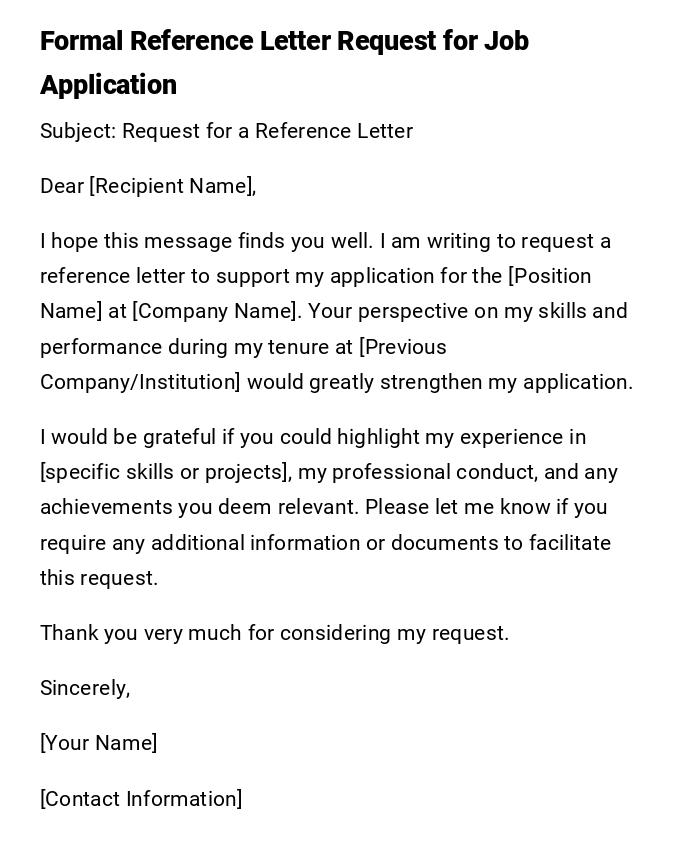
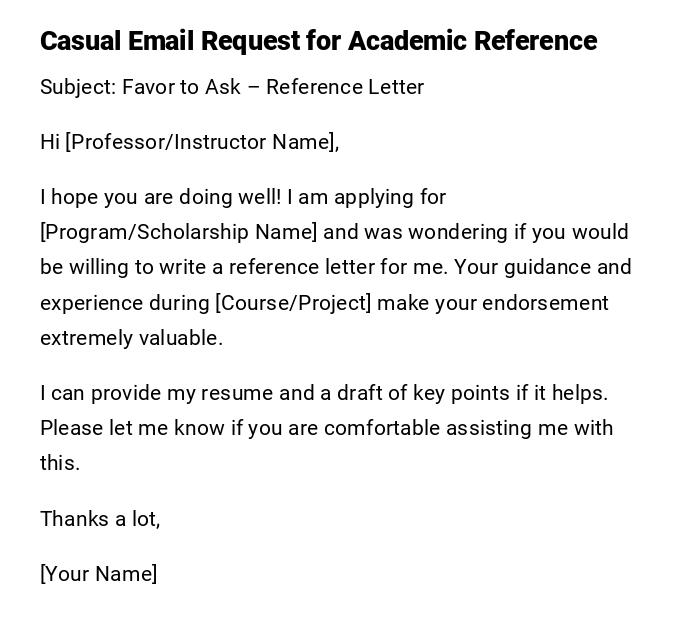
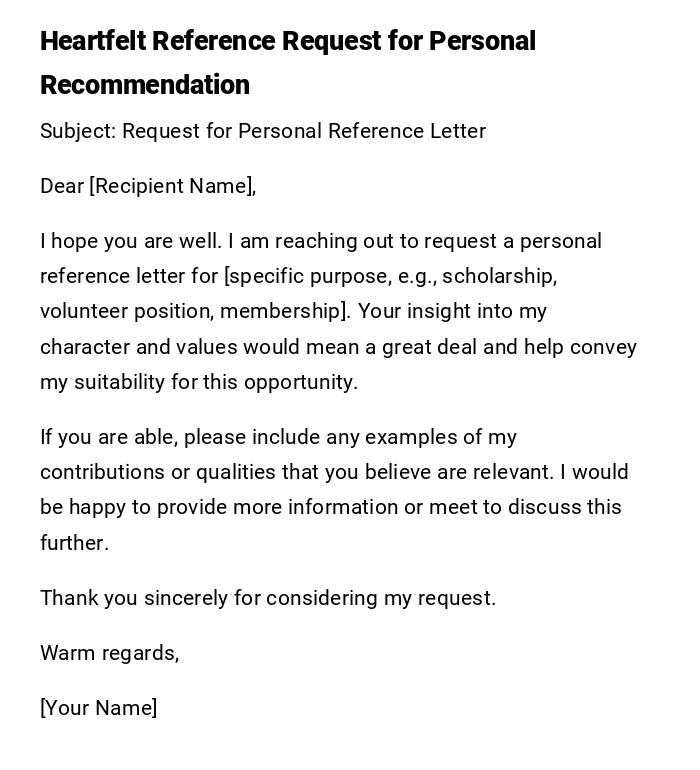
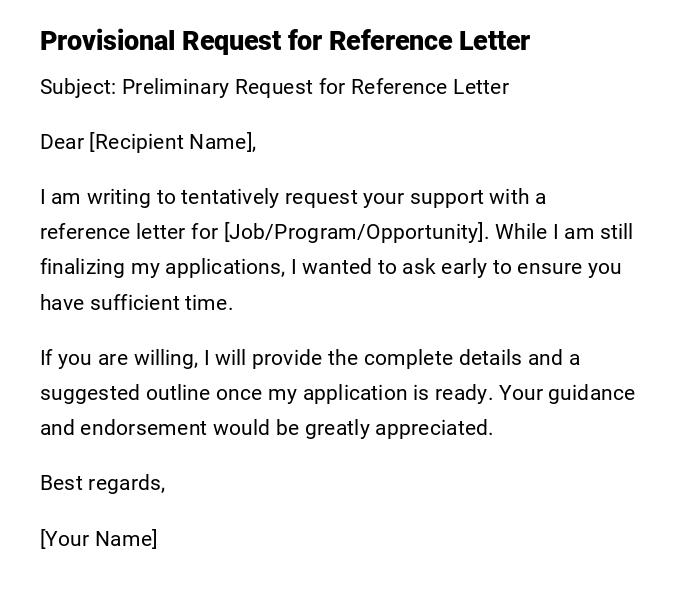
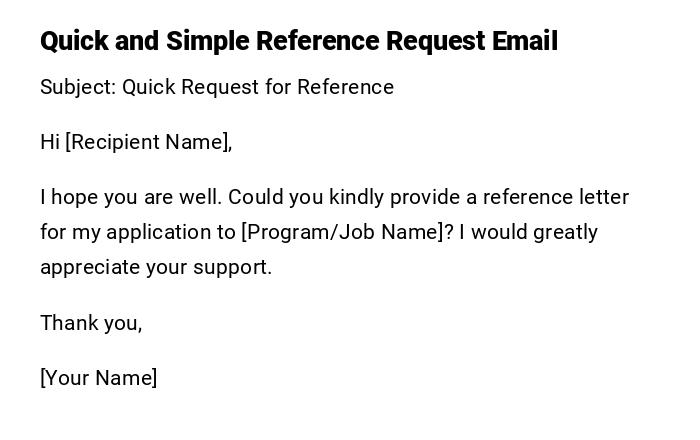
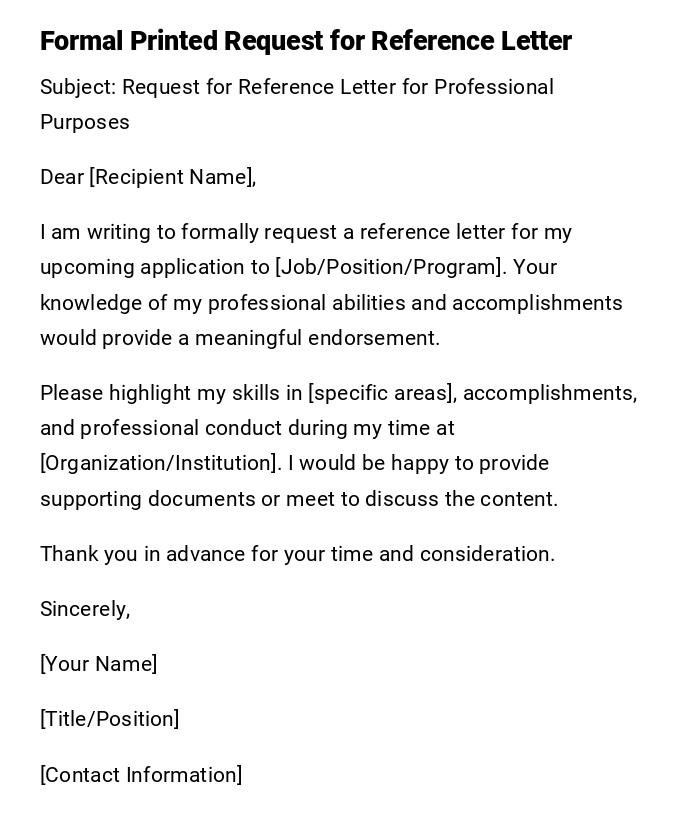
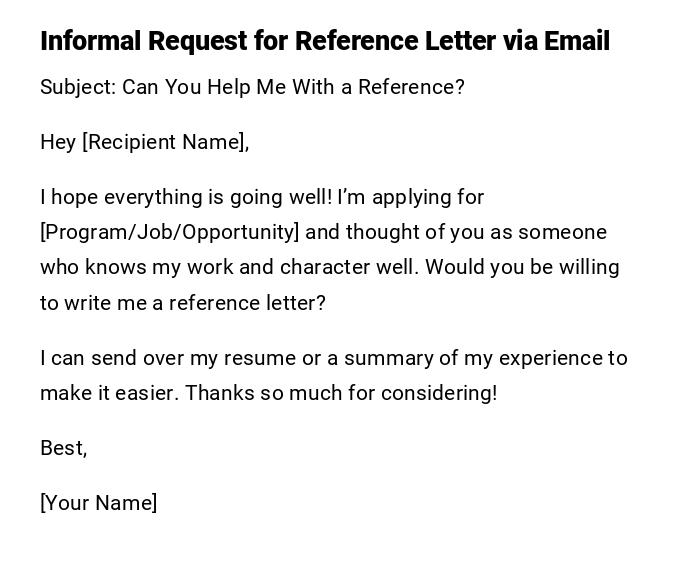
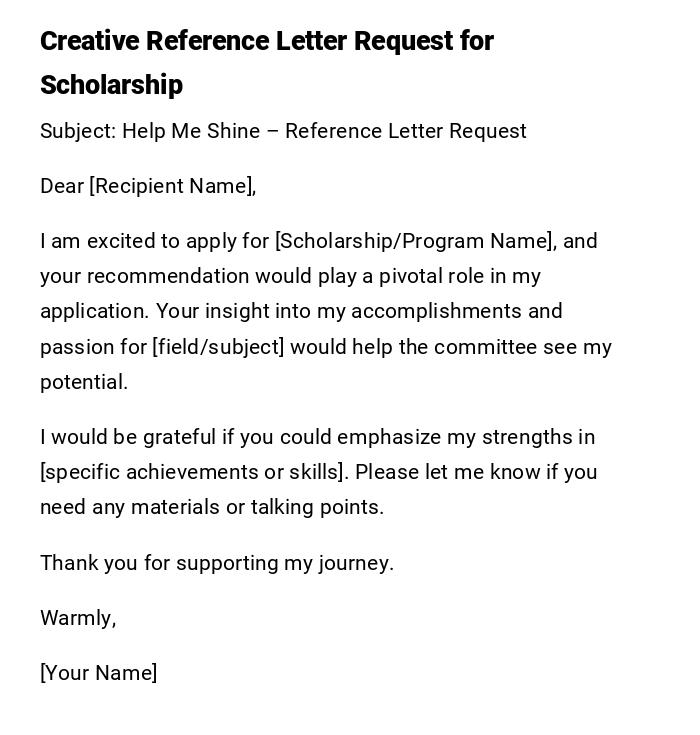

 Download Word Doc
Download Word Doc
 Download PDF
Download PDF